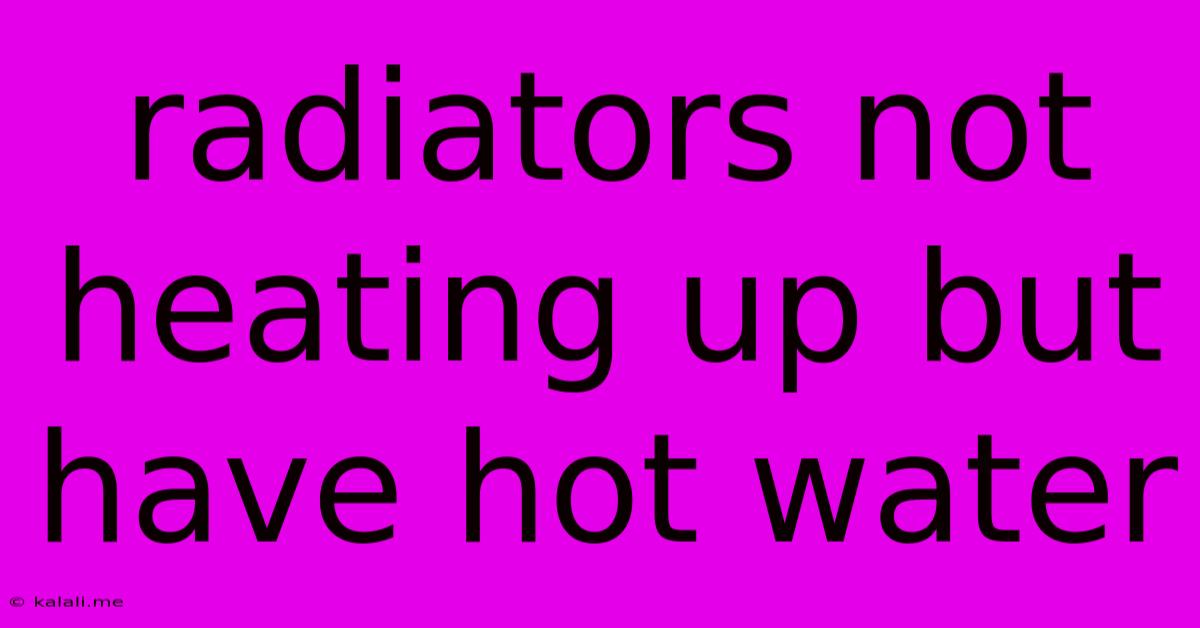Radiators Not Heating Up But Have Hot Water
Kalali
May 21, 2025 · 3 min read

Table of Contents
Radiators Not Heating Up But Have Hot Water: Troubleshooting Guide
Meta Description: Your radiators are lukewarm despite hot water circulating? This comprehensive guide diagnoses common causes, from simple airlocks to more complex heating system issues, offering practical solutions to get your home warm again.
Having hot water circulating through your heating system but cold or lukewarm radiators is a frustrating problem. It means your boiler is working, but something is preventing the heat from transferring effectively to your rooms. This guide will walk you through troubleshooting this common issue, helping you identify the problem and find a solution.
Common Causes of Cold Radiators with Hot Water
Several factors can contribute to radiators staying cold even when your boiler is generating hot water. Let's explore some of the most frequent culprits:
-
Airlocks: This is the most common cause. Trapped air in the radiator prevents hot water from fully circulating, leaving the radiator only partially warm or cold. Airlocks often occur after bleeding radiators or during periods of inactivity in the heating system.
-
Low Water Pressure: Insufficient water pressure in your central heating system can restrict water flow, leading to uneven heating or cold radiators. Check your boiler's pressure gauge – it should ideally be within the manufacturer's recommended range.
-
Sludge or Sediment Buildup: Over time, sediment and sludge can accumulate inside your radiators, restricting water flow and reducing heat transfer efficiency. This is especially common in older heating systems.
-
Faulty Radiator Valves: A malfunctioning thermostatic radiator valve (TRV) or a blocked manual valve can prevent hot water from reaching the radiator. The valve might be seized, damaged, or simply not working correctly.
-
Blocked Pipes: Blockages in the pipes leading to or from the radiator can impede water flow, resulting in insufficient heat output. This could be due to scale buildup, corrosion, or foreign objects.
-
Pump Problems: A malfunctioning central heating pump is unable to circulate water effectively throughout the system. This could be a sign of a failing pump or a problem with its motor.
-
System Leaks: A leak anywhere in the system will impact the water pressure and circulation, leading to underperforming radiators or even cold radiators.
Troubleshooting Steps: A Step-by-Step Guide
Before calling a professional, try these troubleshooting steps:
-
Bleed the Radiators: Start with the radiator furthest from your boiler. Carefully use a radiator key to bleed any trapped air. You should hear a hissing sound, followed by a steady stream of hot water. Close the valve once the water runs clear. Repeat this process for each radiator.
-
Check the Water Pressure: Locate your boiler's pressure gauge and check if the pressure is within the manufacturer's specified range. If it's too low, you might need to top up the system (consult your boiler manual for instructions).
-
Inspect Radiator Valves: Examine your radiator valves for any obvious signs of damage, blockages, or malfunction. Try turning the valves fully on and off to check for smooth operation. If they're seized or damaged, consider replacing them.
-
Check for Leaks: Carefully inspect all visible pipes and joints for any signs of leaks. Even small leaks can significantly impact the system's pressure and performance.
-
Listen to the Pump: Your central heating pump should make a gentle humming noise when the system is running. If you hear unusual noises or no noise at all, it could indicate a pump issue.
-
Power Cycle the Boiler: Turn off your boiler at the mains, wait a few minutes, and then turn it back on. This can sometimes resolve temporary software glitches.
When to Call a Professional
If the problem persists after trying these troubleshooting steps, it's best to call a qualified heating engineer. More complex issues, such as sludge buildup, blocked pipes, or pump problems, require professional expertise and specialized tools to resolve effectively. Ignoring these issues could lead to further damage and higher repair costs in the long run. Remember safety first!
By following this guide, you should be able to diagnose and fix many common causes of cold radiators with hot water circulating, getting your home warm and cozy again.
Latest Posts
Latest Posts
-
How Do I Light A Gas Oven
May 21, 2025
-
What Does Bane Of My Life Mean
May 21, 2025
-
Condensation On Inside Of Windows In Car
May 21, 2025
-
What Did Romans Eat For Breakfast
May 21, 2025
-
Looking Forward To Speak To You
May 21, 2025
Related Post
Thank you for visiting our website which covers about Radiators Not Heating Up But Have Hot Water . We hope the information provided has been useful to you. Feel free to contact us if you have any questions or need further assistance. See you next time and don't miss to bookmark.